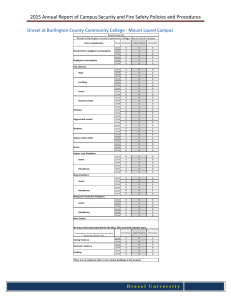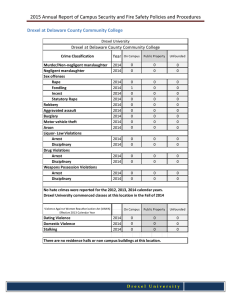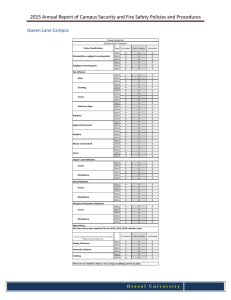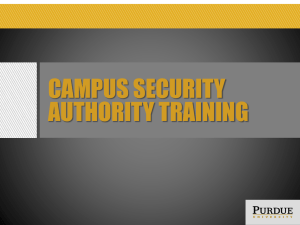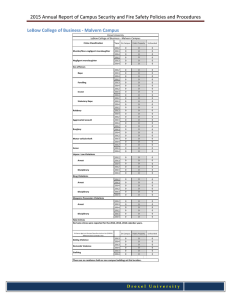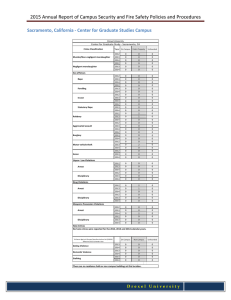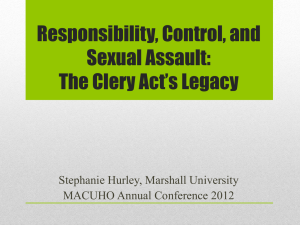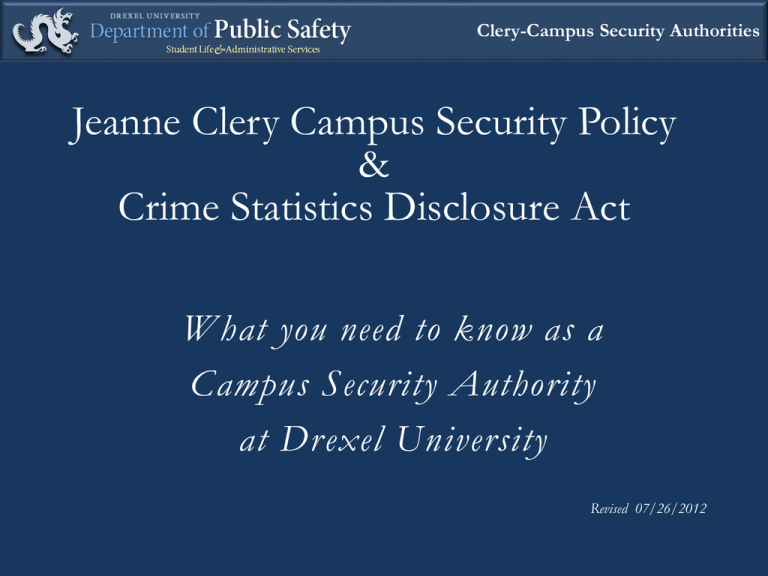
Clery-Campus Security Authorities
Jeanne Clery Campus Security Policy
&
Crime Statistics Disclosure Act
What you need to know as a
Campus Security Authority
at Drexel University
Revised 07/26/2012
Clery-Campus Security Authorities
What is the Clery Act?
Jeanne Clery was raped and murdered in her dorm
room at Lehigh University in 1986. The law enacted
in her memory is intended to ensure that students
and others are informed about violent campus
crimes so they can make informed decisions.
The Jeanne Clery Disclosure of Campus Security
Policy and Campus Crime Statistics Act (Clery Act)
is a federal mandate enacted in 1990 and amended in
1998 and 2008. It requires all institutions of higher
education that participate in the federal student
financial aid program to disclose information about
crime on their campuses and in the surrounding
communities. The Clery Act is enforced by the U.S.
Department of Education. Campuses that fail to
comply with the act can be penalized with large fines
and may be suspended from participating in the
federal financial aid program.
Clery-Campus Security Authorities
So What Does It Have To Do With Me?
Many crimes and incidents, especially sexual
assaults, are not reported to the police.
To ensure that students know about dangers
on their campuses, the Clery Act requires
institutions to gather and publish data from
all Campus Security Authorities for 3 years.
That’s where you come in!
Clery-Campus Security Authorities
What Makes Me A Campus Security Authority?
The Clery Act Defines Four Categories:
Campus police departments
Individuals with campus security responsibilities
Individuals designated by the campus and
Anyone with any responsibility for student and
campus activities who may receive complaints
from a victim of crime.
That’s You!
Clery-Campus Security Authorities
Who is EXEMPT from reporting requirements?
Licensed professional mental health counselors
and
Pastoral counselors employed by a religious
organization to provide confidential counseling
Both must be working within the scope of their license
or religious assignment for the University at the time
they receive the crime report
Clery-Campus Security Authorities
I am a Campus Security Authority and I am not
employed as a counselor – What do I have to do?
IF SOMEONE TELLS YOU ABOUT A CRIME OR
AN INCIDENT THAT MAY BE A CRIME, YOU
MUST RECORD THE INFORMATION AND
PROMPTLY REPORT IT TO THE DREXEL
UNIVERSITY POLICE DEPARTMENT
Clery-Campus Security Authorities
To Whom Should Crimes Be Reported?
Immediately report all crimes, campus emergencies & crimes
in progress to the Drexel University Police Department by
calling the University Public Safety Communications Center
at 215-895-2222
OR Philadelphia Police at 911
OR
by utilizing the crime statistic reporting form located online at
the Drexel Public Safety website.
Clery-Campus Security Authorities
What crimes must I report?
You MUST report any and all of the following crimes:
Criminal Homicide and
Non-Negligent Manslaughter
Negligent Manslaughter
Robbery
Aggravated Assault
Burglary
Motor Vehicle Theft
Arson
Hate Crimes
Crimes Involving Juveniles
Forcible Sex Offenses
Non-Forcible Sex Offenses
Arrests & Disciplinary
Referrals For Liquor, Drug
and Weapons Law Violations
Clery-Campus Security Authorities
Crimes Involving Juveniles
A juvenile is anyone under the age of 18 years
Due to the seriousness of crimes involving juveniles there is an
added duty of care!
YOU MUST IMMEDIATELY REPORT ANY AND
ALL INCIDENTS INVOLVING JUVENILES
to the Drexel University Police Department at 215-895-2222
OR Philadelphia Police at 9-1-1
Clery-Campus Security Authorities
Definitions
Criminal Homicide - The willful (non-negligent) killing of one human
being by another. As a general rule, any death caused by injuries received in a
fight, argument, quarrel, assault or commission of a crime is classified as
Murder and Non-Negligent Manslaughter. You must not classify the following
as Murder and Non-Negligent Manslaughter: suicides, fetal deaths, traffic
fatalities, accidental deaths, assaults to murder and attempts to murder.
Negligent Manslaughter - Is defined as the killing of another person
through gross negligence. As a general rule, any death caused by the gross
negligence of another is classified as Negligent Manslaughter. Deaths of
persons due to their own negligence, accidental deaths not resulting from
gross negligence, and traffic fatalities, are not included in the category
Negligent Manslaughter.
Robbery
- The taking or attempting to take anything of value from the care,
custody, or control of a person or persons by force or threat of force or
violence and/or by putting the victim in fear.
Clery-Campus Security Authorities
Definitions
Aggravated Assault - An unlawful attack by one person upon another for
the purpose of inflicting severe or aggravated bodily injury. This type of
assault usually is accompanied by the use of a weapon or by means likely to
produce death or great bodily harm. (It is not necessary that injury result
from an aggravated assault when a gun, knife, or other weapon is used
which could and probably would result in serious personal injury if the
crime were successfully completed.
Burglary - The unlawful entry of a structure to commit a felony or a theft.
For reporting purposes this definition includes: unlawful entry with intent to
commit a larceny or felony; breaking and entering with intent to commit a
larceny; housebreaking; safecracking; and all attempts to commit any of the
aforementioned
Motor Vehicle Theft - The theft or attempted theft of a motor vehicle
(Classify as motor vehicle theft all cases where automobiles are taken by
persons not having lawful access even though the vehicles are later
abandoned and include joyriding)
Clery-Campus Security Authorities
Definitions
Arson - Any willful or malicious burning or attempt to burn, with or without
intent to defraud, a dwelling house, public building, motor vehicle or aircraft,
personal property of another, etc.
Hate Crimes - Crimes, including any of the aforementioned offenses, and
any other crime involving bodily injury, larceny, simple assault, intimidation
and vandalism, that manifests evidence that the victim was intentionally
selected because of the perpetrator’s bias. The categories of bias are:
•
•
•
•
•
•
Race
Gender
Religion
Sexual orientation
Ethnicity/national origin
Disability
Clery-Campus Security Authorities
Definitions
Sex Offenses – Forcible
Forcible Rape - The carnal knowledge of a person, forcibly and/or against
that person's will; or not forcibly or against the person's will where the
victim is incapable of giving consent because of his/her temporary or
permanent mental or physical incapacity (or because of his/her youth).
Forcible Sodomy - Oral or anal sexual intercourse with another person,
forcibly and/or against that person's will; or not forcibly against the persons
will where the victim is incapable of giving consent because of his/her
youth or because of his/her temporary or permanent mental or physical
incapacity.
Clery-Campus Security Authorities
Definitions
Sex Offenses – Forcible (continued)
Sexual Assault With An Object - The use of an object or instrument to
unlawfully penetrate, however slightly, the genital or anal opening of the
body of another person, forcibly and/or against that person's will; or not
forcibly or against the person's will where the victim is incapable of giving
consent because of his/her youth or because of his/her temporary or
permanent mental or physical incapacity.
Forcible Fondling - The touching of the private body parts of another
person for the purpose of sexual gratification, forcibly and/or against that
person's will; or, not forcibly or against the person's will where the victim is
incapable of giving consent because of his/her youth or because of his/her
temporary or permanent mental incapacity.
Clery-Campus Security Authorities
Definitions
Sex Offenses – Non-forcible
Incest - Non-forcible sexual intercourse between persons who are related to
each other within the degrees wherein marriage is prohibited by law.
Statutory Rape - Non-forcible sexual intercourse with a person who is
under the statutory age of consent
Clery-Campus Security Authorities
Arrests & Disciplinary Referrals
In addition to disclosing statistics for the aforementioned crimes, the Clery
Act requires institutions to disclose both the number of arrests and the
number of persons referred for disciplinary action for:
Illegal weapons possession - The violation of laws or ordinances dealing
with weapon offenses, regulatory in nature, such as: manufacture, sale, or
possession of deadly weapons; carrying deadly weapons, concealed or
openly; furnishing deadly weapons to minors; aliens possessing deadly
weapons; and all attempts to commit any of the aforementioned.
Drug law violations - Violations of State and local laws relating to the
unlawful possession, sale, use, growing, manufacturing, and making of
narcotic drugs. The relevant substances include: opium or cocaine and their
derivatives (morphine, heroin, codeine); marijuana; synthetic narcotics
(demerol, methadone); and dangerous nonnarcotic drugs (barbituates,
benzedrine).
Clery-Campus Security Authorities
Arrests & Disciplinary Referrals (continued)
Liquor law violations - The violation of laws or ordinances
prohibiting: the manufacture, sale, transporting, furnishing, possessing
of intoxicating liquor; maintaining unlawful drinking places;
bootlegging; operating a still; furnishing liquor to a minor or
intemperate person; using a vehicle for illegal transportation of liquor;
drinking on a train or public conveyance; and all attempts to commit
any of the aforementioned.
Note: Drunkenness and driving under the influence are not included in
this definition.
Clery-Campus Security Authorities
Arrests & Disciplinary Referrals (continued)
It’s important to remember that you are to disclose “violations of the law”
resulting in arrests or persons being referred for disciplinary action.
Do not include violations of your institution’s policies that resulted in
persons being referred for disciplinary action if there was no violation of
the law. For example, if a student of legal drinking age in the state in
which your institution is located violates your institution’s “dry campus”
policy and is referred for disciplinary action, that statistic should not be
included in your institution’s crime statistics, because the referral was not
the result of a violation of the law.
WHEN IN DOUBT REPORT!!!
The Drexel University Police Department will make the
determination on whether there was a violation of the law.
Clery-Campus Security Authorities
Timely Reporting is Critical
Be sure to document & report in a timely manner:
WHEN - the crime or incident occurred
WHERE - the crime and incident occurred and
WHEN - it was reported to you
Clery-Campus Security Authorities
Location, Location, Location
A crime must be reported if it occurred:
On campus or on Drexel University property
In on-campus student residences (even if privately
owned & operated)
On public property adjacent to campus
On certain non-campus property or off-campus property
Remember: WHEN IN DOUBT REPORT!!!
Clery-Campus Security Authorities
Tell The Student About Reporting Options,
And Where They Can Receive Assistance!
For example:
A student tells you that she was raped by another student at
her off-campus apartment. The victim is eligible for campus
assistance and resources from:
The Office of Victim Support & Intervention Services
Counseling Services
Student Health Services
Residential Living Office
Although the crime did not occur at a location covered by
Clery reporting, the accused student IS subject to criminal and
University disciplinary action for this off-campus conduct.
Remember: WHEN IN DOUBT REPORT!!!
Clery-Campus Security Authorities
Just the facts…
Your job is to get the information the person is willing to tell you
Remember:
The police will investigate and categorize the incident
You are not a detective
You don’t have to prove what happened or who was at fault
You are not supposed to find the perpetrator
Use the report form, but DO NOT identify the victim
UNLESS he or she gives you permission
Remember: WHEN IN DOUBT REPORT!!!
Clery-Campus Security Authorities
Describe options
Encourage the person to report the incident to police but do
not insist. The decision isn’t yours. A person who talks to
you may not want to talk to the police – and doesn’t have to.
Tell him/her about the Confidential Reporting process
Remember: WHEN IN DOUBT REPORT!!!
Clery-Campus Security Authorities
Clery Disclosure Requirements
Timely Warnings
Daily Crime Log
Annual Statistics
Clery-Campus Security Authorities
Timely Warnings
The Clery Act requires campuses to alert the campus
community to certain crimes in a manner that is timely and
will aid in the prevention of similar crimes.
Information must be reported in a timely manner so that a
determination can be made to issue a Timely Warning to
the Drexel Community
Information that Promotes safety
Allows Individuals to Protect Themselves and
Identifies the Time, Location and Type of Crime
Clery-Campus Security Authorities
The Daily Crime Log
Is located on the Public Safety Website at:
http://www.drexel.edu/publicsafety/crimereporting/crimelog/
Clery-Campus Security Authorities
Missing Student Reports
Any Campus Security Authority who receives a
report of a missing student shall immediately contact
the Drexel University Public Safety Communications
Center to report the information.
DREXEL PUBLIC SAFETY:
215-895-2222
Remember: WHEN IN DOUBT REPORT!!!
Clery-Campus Security Authorities
Help is at hand….
DREXEL UNIVERSITY PUBLIC SAFETY
CLERY COMPLIANCE OFFICER
Maurizio DeLisi
md594@drexel.edu
215-895-0368
www.drexel.edu/publicsafety/crimereporting/clery/

